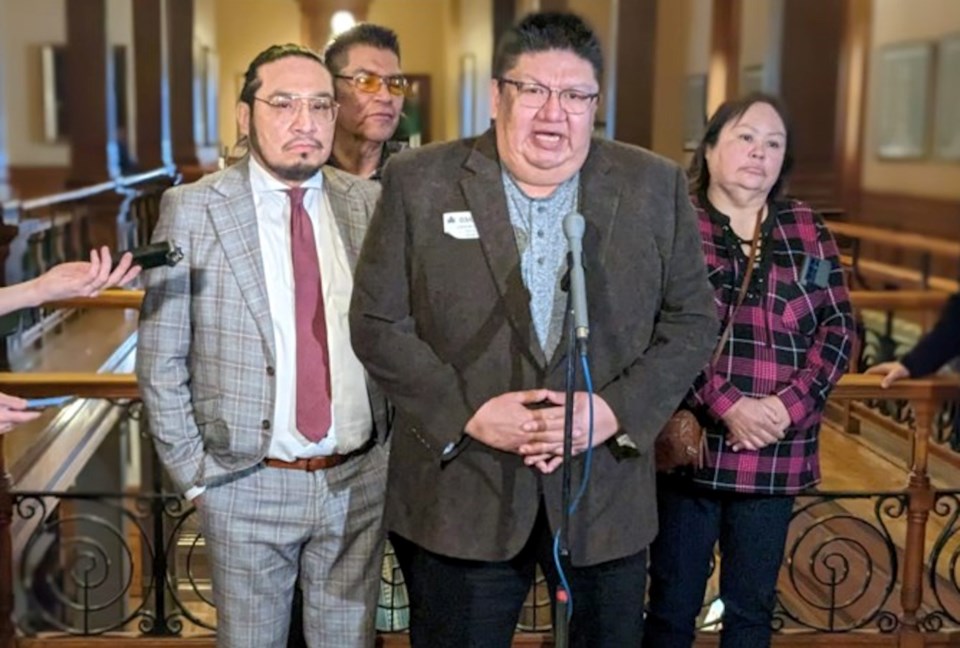Kiiwetinoong MPP Sol Mamakwa took the Ford government to task in the Ontario Legislature March 9 for proposing changes to the provincial Mining Act, accusing them of not consulting with First Nations.
Mines Minister George Pirie announced the first of an upcoming raft of amendments to the act with more industry-friendly measures designed to put into new mines into commercial production faster.
The proposed amendments to geared to the closure plans of producers of critical minerals, like nickel, copper, lithium and cobalt, but it will also cover precious metal producers like gold.
That didn’t square with Mamakwa, who’s expansive northwestern Ontario riding includes Neskantaga First Nation. The leadership in the remote community believes proposed development in the Ring of Fire mineral belt will have long-term negative impacts on the community and does not have faith in the environmental assessment processes.
“This is a textbook play right out of the colonial playbook,” said Mamakwa, “where governments divide and conquer First Nations. We live it every day. How will you ensure all First Nations are on board?
Bill 71, the Building More Mines Act, was introduced in the legislature March 2. After second reading this week, the bill hits the road for consultation sessions next month and could be passed into law by summer.
Earlier this week, during the PDAC mining convention in Toronto, the government said it had approved the terms of reference for the assessment process of the road network to the Ring of Fire mineral deposits.
The Ring of Fire and its associated road network is a hugely controversial subject with Neskantaga and some of the outlying communities. They harbour concerns about downstream and long-term ecological impacts and disruption to the environment caused by mining activity.
Two Indigenous communities close to the Ring of Fire, Webequie and Marten Fall, are leading the road assessments and the technical studies with the backing of the provincial government.
Mamakwa stood up for his constituents in Neskantaga who contend they will not allow a road to cross their traditional territory “without the free, prior and informed consent of the people.”
He accused the government of not consulting with the community and not obtaining consent of all area First Nations that would be impacted by the proposed Northern Road Link.
Also on the scene at Queen’s Park was Neskantaga Chief Chris Moonias who demanded a meeting with Premier Doug Ford.
“This is a bill about building mines,” replied Mines Minister George Pirie. “It’s about bringing prosperity to Northern Ontario,” said Pirie as part of the government’s critical minerals to establish a domestic mining, mineral processing and electric vehicle manufacturing supply chain.
“These minerals right now are being secured in Russia and China and (Democratic Republic of) Congo, and we need those minerals secured in Ontario, out of northern Ontario.”
Pirie said the legislation does not shirk the government’s duty to consult with First Nations and does not degrade “Ontario’s environmental standards.”
“This is a world-class bill that will benefit every single citizen in Ontario.”
The Standing Committee on the Interior will hold public hearings on Bill 71 in Timmins on Wednesday, April 5 and in Sudbury on Thursday, April 6.
Interested people who wish to make an oral presentation are required to register by 12:00 p.m. on Monday, March 27.
Those who wish to comment on the bill may send a written submission by 7:00 p.m. on Thursday, April 6.
To register or send a written submission, please visit the following link: ola.org/en/apply-committees.
An electronic version of the bill is available on the Legislative Assembly website at ola.org.




